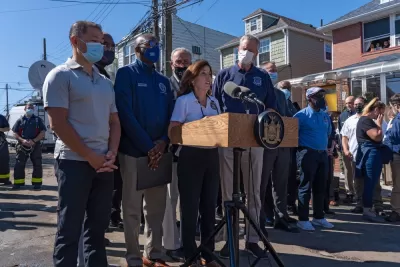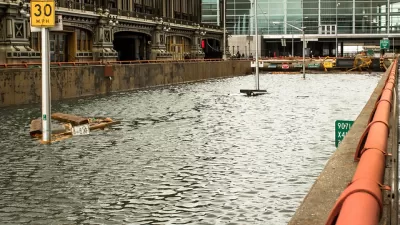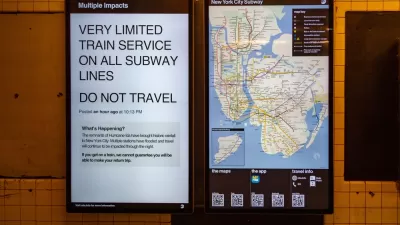Basement apartments were the least safe place to be as the remnants of Hurricane Ida sent floodwaters ripping through the Northeast.

Now that the water has receded and the Northeast is taking stock of the costs—human and economic—from the historic flooding that followed as the remnants of Hurricane Ida ripped through the northeast, basement apartments have been identified as a primary source of deadly risk throughout the storm.
Much of the media focus in the wake of Ida in northeast is focusing on illegal basement apartments—a huge source of housing for low-income communities in around New York City. "Cramped basement apartments have long been a prevalent piece of New York City’s vast housing stock, a shadowy network of illegal rentals that often lack basic safety features like more than one way to get out, and that yet are a vital source of shelter for many immigrants," write Mihir Zaveri, Matthew Haag, Adam Playford, and Nate Schweber for The New York Times.
As of the writing of the New York Times article, 11 of the 13 people killed during Ida in New York City died in a basement apartment—as many as had died in the state of Louisiana (again, at the time of the writing).
The public health and safety risks of basement apartments are well documented, according to the article, regarding fires or carbon monoxide poisoning. Climate change introduces a new risk, however: "the likelihood of deadly flooding, when a wall of water blocks what is often the only means of escape."
Building and safety regulations had trouble keeping up with basement apartments before extreme weather scrambled risk in the United States. The city had received 157,000 complaiints about illegal basement apartment conversions in 2021 leading up the tragic arrival of Ida to New York. "The law governing these apartments is complex, and includes rules that say a basement’s ceilings must be at least 7 feet 6 inches high and that living spaces must have a window. The city must approve apartments with a certificate of occupancy before they can be rented."
The article includes testimony from residents of basement apartments—including some who lived through potentially fatal flooding.
FULL STORY: How the Storm Turned Basement Apartments Into Death Traps

Study: Maui’s Plan to Convert Vacation Rentals to Long-Term Housing Could Cause Nearly $1 Billion Economic Loss
The plan would reduce visitor accommodation by 25,% resulting in 1,900 jobs lost.

North Texas Transit Leaders Tout Benefits of TOD for Growing Region
At a summit focused on transit-oriented development, policymakers discussed how North Texas’ expanded light rail system can serve as a tool for economic growth.

Using Old Oil and Gas Wells for Green Energy Storage
Penn State researchers have found that repurposing abandoned oil and gas wells for geothermal-assisted compressed-air energy storage can boost efficiency, reduce environmental risks, and support clean energy and job transitions.

Santa Barbara Could Build Housing on County Land
County supervisors moved forward a proposal to build workforce housing on two county-owned parcels.

San Mateo Formally Opposes Freeway Project
The city council will send a letter to Caltrans urging the agency to reconsider a plan to expand the 101 through the city of San Mateo.

A Bronx Community Fights to Have its Voice Heard
After organizing and giving input for decades, the community around the Kingsbridge Armory might actually see it redeveloped — and they want to continue to have a say in how it goes.
Urban Design for Planners 1: Software Tools
This six-course series explores essential urban design concepts using open source software and equips planners with the tools they need to participate fully in the urban design process.
Planning for Universal Design
Learn the tools for implementing Universal Design in planning regulations.
Ascent Environmental
Borough of Carlisle
Institute for Housing and Urban Development Studies (IHS)
City of Grandview
Harvard GSD Executive Education
Toledo-Lucas County Plan Commissions
Salt Lake City
NYU Wagner Graduate School of Public Service





























